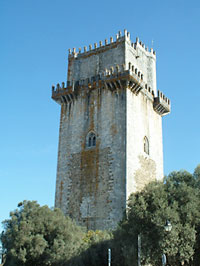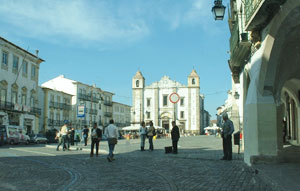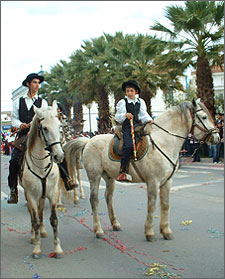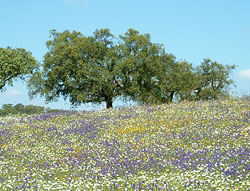Vale da Cegonha - Luxury Self Catering Holiday Accommodation

Local Interests & Activities
 |
| Beja Castle. |
When visiting Portugal, you might think that this has always been a very peaceful and tranquil country, where nothing much has ever happened. But how wrong you would be: Portugal has a long and often turbulent history.
Most of the conquering civilizations - the Greeks, Romans, Visigoths, Moors and Knights Templar to name but a few - have been here: leaving their own particular marks in terms of architecture, agriculture, culture and learning. The Portuguese language though essentially Latin based still retains many Arabic words and the faces of the people also bear witness to their diverse ancestry.
As a once great seafaring nation, the Portuguese themselves were responsible for many great global discoveries. Invasion and colonisation often followed, bringing great wealth into Portugal - gold and diamonds from Brazil, slaves from Angola and Mozambique and silks and exotic spices from North Africa, Goa and Macau in the Far East.
To all this you must add a history of constantly warring Royal Families, frontier battles with Spain and a 20th century dictatorship under Salazar, followed by a peaceful revolution in 1974.
A lot of history for a relatively small country!
What To See And Where
History
Beja and Evora were both important Roman towns and both also have Moorish quarters still remaining. The delightful village of Mertola, once a major port on the |
| Main square in Evora. |
Silves was once the Moorish capital of much of Southern Spain and Portugal and has an imposing red brick castle. You should also consider visiting Serpa: a Medieval fortified town, where the castle, most of the town walls and aqueduct are still standing.
Even Older History
The Alentejo plains are littered with ancient Megalithic standing stones, stone circles and burial grounds: built some 5000 to 6000 years ago. Just outside of Ourique is the site of Castro da Cola and there are many other prehistoric sites between here and Evora.
Ourique - Past and Present
 |
| Ourique Carnival. |
Ourique is the nearest town to our country house accommodation at Vale da Cegonha. Historically Ourique has 2 claims to fame. Firstly it was the site of a 12th century battle that eventually led to the overthrow of the Moors. There are a couple of statues in the town marking the event. Secondly and much more recently, it was in the fields surrounding this area that young men gathered for ‘picnics’. The purpose being to plot the 1974 revolution far away from the prying eyes of the hated Secret Police.
Ourique today is a thriving and well equipped town. There are shops and supermarkets, banks, cash points and a post office, an internet café and a petrol station just outside of town. It also has a hospital/health centre, pharmacy, police station and fire brigade. A good selection of cafes and restaurants are in the town or nearby with varied menus at reasonable prices.
Ourique is also now regarded as the ‘capital’ of the black pig (porco preto) producing area of the Southern Alentejo. As with most livestock here they are free range reared and the quality of the meat, cured hams and smoked sausages (chouricos) is superb.
Other culinary delights from this area include hearty breaded soups (acordas), tasty lamb dishes and a wide variety of fish and other seafood.
Once again history has had a hand in shaping the local cuisine. Herbs and spices from North Africa, India and the Far East combine effortlessly with typical Mediterranean ingredients - olives, olive oil, tomatoes and garlic - to produce a uniquely Portuguese flavour.
Wonderfully calorific desserts (traditionally made by nuns) are also a ‘must’, as are the many varieties of hand made cheeses.
Image Gallery
You can view more photos of local attractions in our Image Gallery.
Other Places to Visit
The new Alqueva Dam that has been built across the Guadiana River has created the largest single reservoir in Europe. Viewed from the ramparts of the Medieval walled village of Monsaraz, it is a breathtaking sight and the dam itself will be of great interest to those who like to see modern technology at its best.
Nature Reserves
 |
| Spring flowers at Vale da Cegonha |
Local nature reserves are home to a number of endangered bird species, including the Lesser Kestrel and the Great Bustard - the largest flighted bird in Europe. There is also a project underway to re-introduce the Iberian Lynx to this area. Visits can be arranged to all these locations.
Vineyards
Locally produced wines, particularly the red wines, are strong, robust and extremely good quality. A visit to a local vineyard will allow you to sample various wines and you can also enjoy a typical Alentejo lunch while you are there.
Other Activities
Exploring The Tracks
Many age old cartways criss-cross the landscape. You can explore on foot or by bicycle.
Alternatively we can arrange for you to travel on horseback, quad bike or jeep. Whichever you chose, you are guaranteed a day of discovery and adventure.
If you really feel like splashing out, you can view the area from the air in a hot air balloon or light aircraft.
Fishing
For the fishing enthusiast there is much to enjoy here. Local rivers and the Monte da Rocha lake provide good freshwater sport and boat trips can be arranged for sea fishing.
Please advise us at the time of booking if you would like a fishing permit to be arranged for you.
Golf
Currently the nearest golf courses are to be found on the Algarve, about 1 hour away. We are happy to make arrangements for you to play. Two new courses are planned for this area in the near future.
But, if all of this sounds just too much then stop, relax and simply enjoy this magical area of Portugal from the comfort of one of our lovely country houses, at Vale da Cegonha.
Note: Full descriptions of all the places to visit and activities mentioned above, including prices, are given in our Visitor Information Folders.
